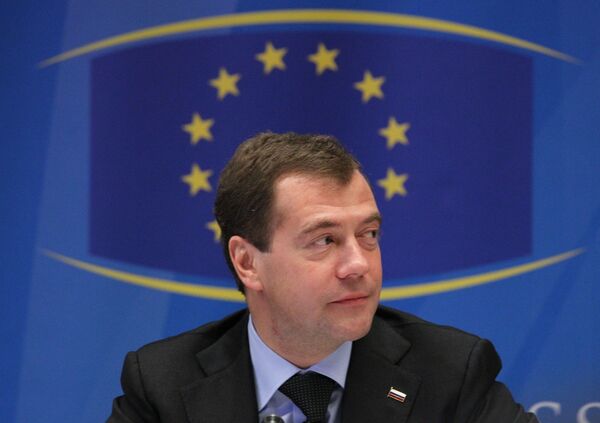President Dmitry Medvedev went to Brussels for two reasons - to attend the 26th EU-Russia summit on December 7 and to make a state visit to the Kingdom of Belgium on December 8.
The summit dealt largely with Russia's accession to the WTO. The first thing the sides did in Brussels was sign a memorandum of understanding supporting Russia's bid, thus clearing the path for Russia's entry into the leading global trade club. The only major obstacle that remains is the United States.
The door is open but it's still creaky
The holiday season is upon us, and it's tempting to see EU support for Russia's WTO accession as a present. But we shouldn't assume that it's already a done deal, as we wouldn't want to jinx ourselves. After all, we've been trudging along an uphill road to the WTO for more than 17 years. In 1993, we made our first bid to join its predecessor, the General Agreement on Tariffs and Trade (GATT). The Soviet Union wanted to join even earlier, in the mid 1980s, but the United States vetoed its application before it was even reviewed. How can a country with a planned socialist economy be accepted into a trade organization?
Russia has already concluded bilateral talks on its accession to the WTO with any and all countries that requested them. WTO member states will now hold multilateral talks and then the working group on Russia's entry will review its application. We have overcome 90% of the obstacles in our way. All that's left is the United States.
In principle, the United States approved Russia's entry in the WTO under President George W. Bush in 2006 by signing an agreement on mutual access to markets with us, although it was more a letter of intent than an agreement. Similarly, an agreement on WTO accession is not even an international treaty as such, but rather a kind of a trade and economic contract under which we pledge to abide by universal commercial standards and general principles. Following that 2006 trade deal, Washington incessantly criticized Russia for its "trade behavior." In early October, we signed another agreement on bilateral trade relations and removed all "key obstacles," but even this was not enough.
To give Russia the trade preferences that are enjoyed by all other countries, the United States must first repeal the Jackson-Vanik amendment of 1974, which ties trade relations to human rights, including emigration from the U.S.S.R. There have not been any problems with emigration for a long time now, yet the amendment is still in force. The incoming Congress - with a Republican House of Representatives and narrow Democratic control in the Senate - is unlikely to repeal it. And there's nothing President Barack Obama can do about it without Congress. As long as Jackson-Vanik is in place, the door to the WTO will remain closed.
Is Georgia an obstacle?
Tbilisi's resistance to Russia's admission into the WTO is not actually a serious problem. Georgia withdrew its support for Russia's accession following their short war in August 2008. In theory, all 153 member countries of the WTO must approve a new member, so it would seem that President Mikheil Saakashvili could easily sabotage Russia's bid. But this is only in theory.
Georgia is unlikely to block Russia's entry because it has nothing to gain from this. Moreover, no minor member of the WTO and GATT (let alone a dwarfish member like Georgia) has ever managed to block the entry of a major economic power. Russia is the world's biggest economy outside the WTO. The United States, Germany and France can easily pressure their Georgian friend to vote the right way, as they've assured Russia off the record.
Europe still blocking Russians' entry to Europe
The European Union and Russia are also discussing visa-free travel and a new agreement on partnership with the EU, but little progress has been made. The EU thinks it's still too early for Russians to enjoy the luxury of the visa-free Schengen zone, although some countries enthusiastically support the idea. For the time being, we'll have to tailor our legislation to EU requirements. Brussels believes that simplified visa procedures for business people, students and scientists are sufficient.
The views expressed in this article are the author's and may not necessarily represent those of RIA Novosti.

